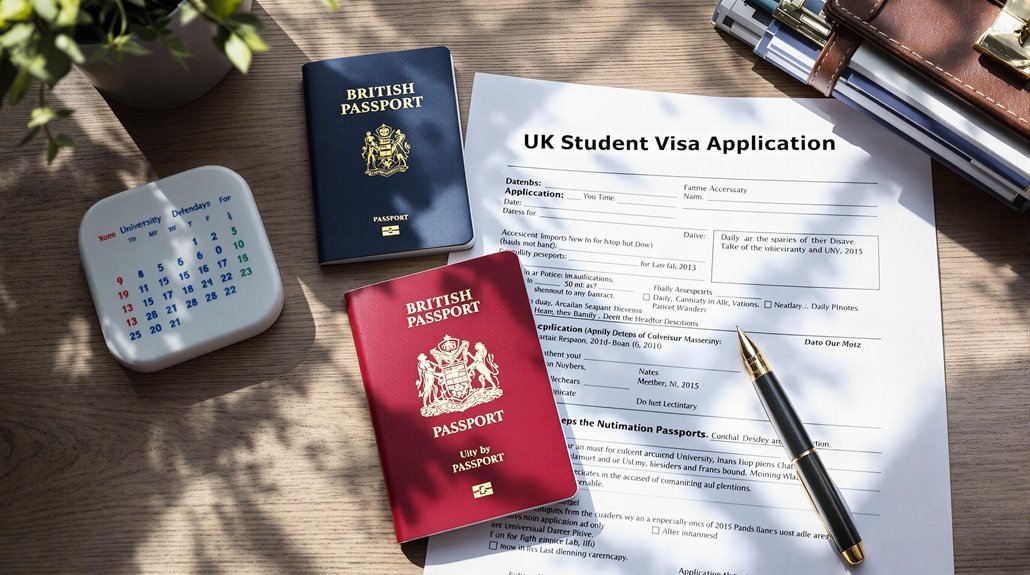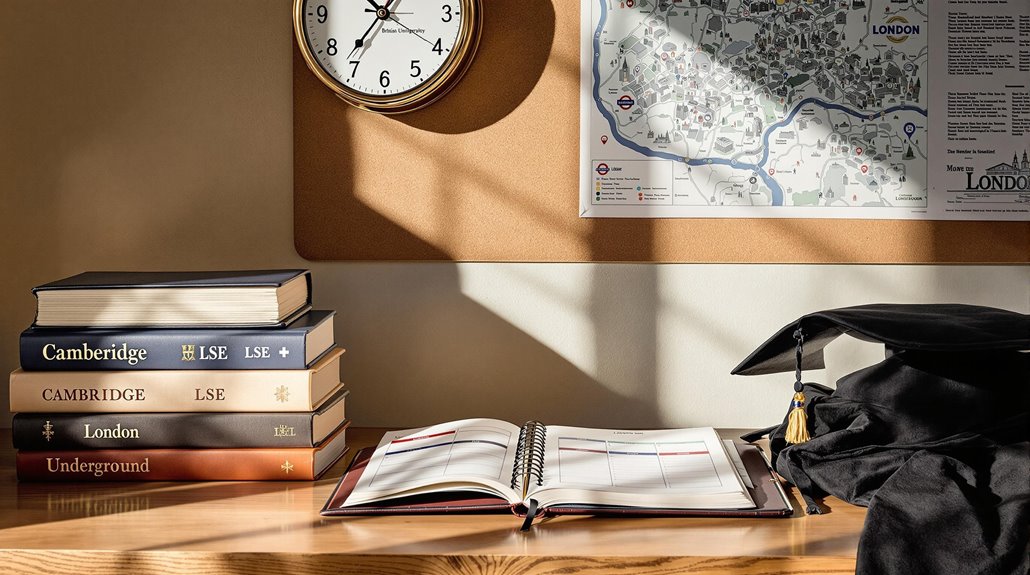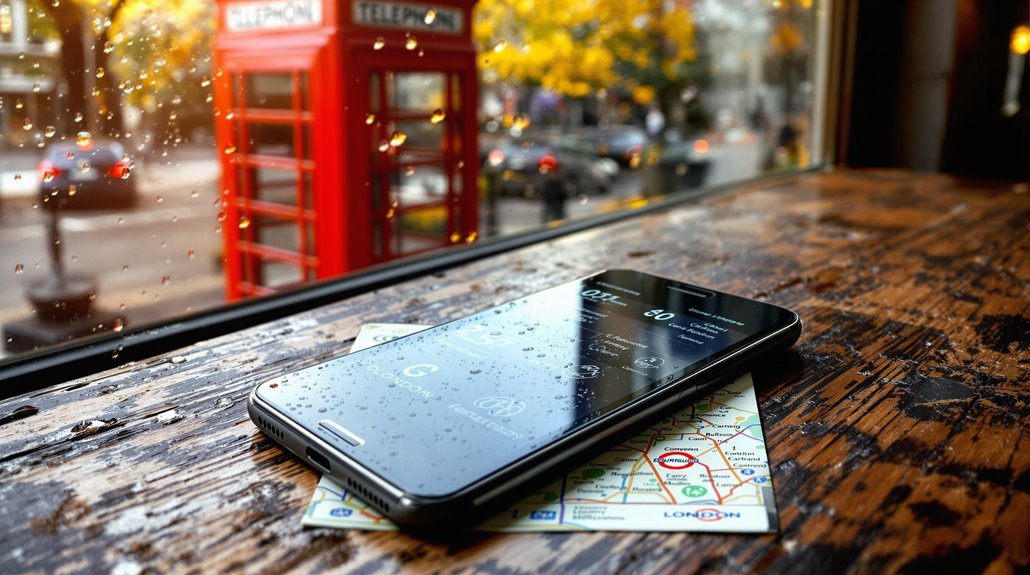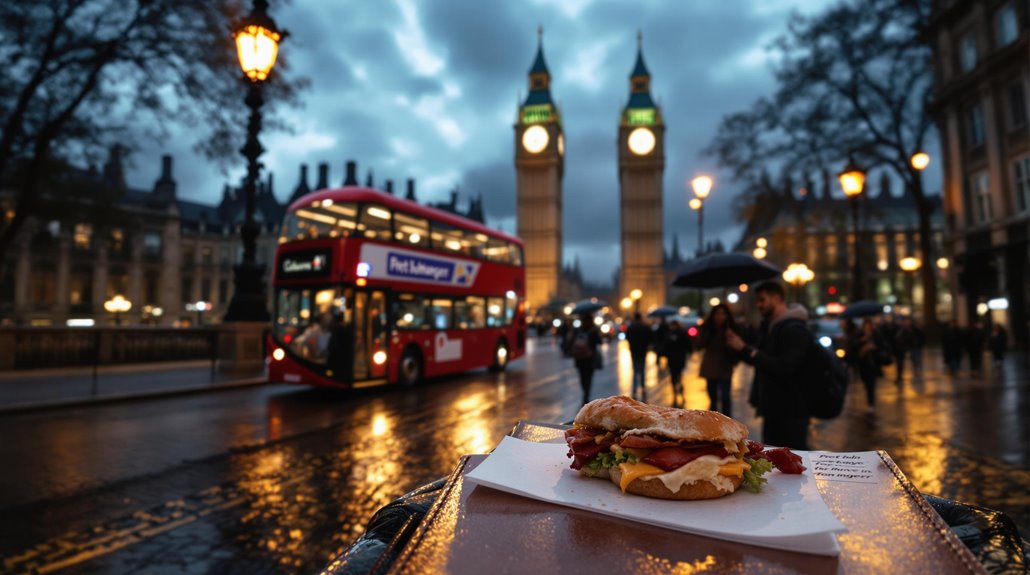Before heading to London for your studies, you'll need to secure your student visa, arrange accommodation, and set up a UK bank account. You should familiarize yourself with the NHS healthcare system, master the Tube's extensive network, and budget for living costs (at least £1,265 monthly in London). Don't forget to pack for unpredictable weather, learn British social etiquette, and arrange a phone plan. These essentials are just the beginning of your London adventure.
- Understanding the UK Student Visa Requirements
- Navigating London's Housing and Accommodation Options
- Managing Your Money and Banking in the UK
- Getting Around: Transportation and Oyster Cards
- British Academic System and Class Expectations
- Healthcare Coverage and NHS Registration
- Weather Preparedness and Packing Essentials
- British Culture and Social Etiquette
- Phone Plans and Staying Connected
- Safety Tips and Emergency Resources
- The Last Word
Understanding the UK Student Visa Requirements

So you're planning to study in London? Let's explore the vital visa requirements you'll need to tackle.
First, you'll have to score 70 points under the UK's point-based immigration system, and if you're from the EU/EEA arriving post-Brexit, this applies to you too. You'll need a Confirmation of Acceptance for Studies (CAS) from your chosen institution, plus proof of English proficiency at B2 level for degree programs.
Post-Brexit UK student visas require 70 points, a CAS from your university, and B2-level English for all international students.
Now, let's talk money – you'll need to show £1,265 per month for living costs in London, and these funds must sit untouched in your account for 28 days. Creating a detailed budget breakdown will help you understand and plan for both upfront and hidden costs during your stay.
The application process starts online up to 6 months before your course, costing £348 if applying from abroad. Don't forget your mandatory documents, including passport, CAS, and financial proof! You'll also need to visit a Visa Application Center to submit your biometrics.
Navigating London's Housing and Accommodation Options
When it comes to finding your perfect London home-away-from-home, you'll discover a diverse range of accommodation options that can fit both your lifestyle and budget.
From university halls ideal for first-years to trendy co-living spaces in Kingsland Road, London's student housing scene has a lot to offer.
You'll want to evaluate your budget carefully, as prices vary greatly by zone and room type. While a shared room in Zone 3 might set you back £392 monthly, a studio in Zone 1 could cost upwards of £1,820.
Don't forget to factor in essential amenities like WiFi and security features, and if you're contemplating a shared space, take time to assess potential roommates' habits. Starting your housing search 6 months ahead will give you the best chance of securing your preferred accommodation.
For peace of mind, look for accommodations offering "No Visa No Pay" policies, especially when booking from abroad. Industry data shows that 39% of undergraduates in London are international students, making these flexible booking policies increasingly important.
Managing Your Money and Banking in the UK

Opening a UK bank account represents one of the most crucial steps you'll take as an international student in London, providing essential access to British financial services and safer money management. You'll need to prepare important documents like your valid passport and visa before applying. Several major banks cater specifically to international students, making your shift smoother.
A UK bank account is vital for international students, offering secure financial services and a smoother transition to London life.
Understanding proper student budgeting skills will help you make the most of your UK bank account while studying abroad.
When choosing your bank, consider these key factors:
- HSBC's flexibility allows EU students to open accounts from home, though you won't get overdraft privileges.
- NatWest's International Student Account offers convenient online setup if you're already UK-based.
- Santander's Basic Current Account provides free Euro transfers, though there's a £25 fee for other services.
With options like Barclays, TSB, and Al Rayan also available, you'll find a banking solution that fits your needs while studying in London's dynamic environment.
Getting Around: Transportation and Oyster Cards
London's five major transport networks offer you an unparalleled way to explore the city's vibrant neighborhoods and cultural landmarks.
You'll find the Underground, or "Tube," at your disposal with its 11 lines and 272 stations, including 24/7 weekend service on popular routes like the Central line.
For budget-conscious students, buses provide extensive coverage at £1.75 per ride, while the driverless DLR connects you to East London's bustling areas. Students can enjoy significant savings by linking their 16-25 Railcard to their Oyster card.
If you're heading to South London, hop on a tram for a cost-effective journey, or take a scenic Thames Clipper ride to travel between Greenwich and Central London.
Don't forget to grab a Student Oyster Card, which saves you 30% on fares across the network, making your London adventures more affordable.
The comprehensive Night Bus network runs 24 hours, ensuring safe transport back to your accommodation after late-night study sessions or social events.
British Academic System and Class Expectations

As you prepare for your British university experience, you'll encounter an academic system that's quite different from what you might be used to.
The UK emphasizes independent thinking and self-directed study, where you're expected to take charge of your learning journey. Understanding the grading system is vital, as you'll be working with classifications rather than traditional letter grades. The teaching excellence framework helps ensure high standards across UK universities. Most UK programs focus heavily on classroom discussions and analytical thinking.
Independent study is at the heart of British education, requiring students to navigate a unique grading system and drive their own academic success.
- Active participation is essential – silent students are often viewed as disengaged.
- Grades follow a unique system: First Class (70%+), Upper Second (2:1), and Lower Second (2:2).
- Late assignments typically incur a 10% penalty per day, so time management is imperative.
Healthcare Coverage and NHS Registration
Understanding healthcare coverage while studying in the UK will greatly impact your peace of mind and overall experience abroad.
If you're studying for six months or longer, you'll need to pay the Immigration Health Surcharge (IHS) to access NHS services, which costs £235 for up to 12 months or £470 per year for longer stays.
You'll need to register with a local GP to access most NHS services, though dental and optical care will cost extra.
If you're an EU student with an EHIC or GHIC card, you'll get reduced-cost care, but you'll still need NHS coverage.
For shorter stays under six months, you'll need private insurance, which typically runs £30-£70 monthly.
Don't forget to verify coverage for any pre-existing conditions and necessary vaccinations. The NHS provides free Covid-19 treatment and testing regardless of your immigration status.
Weather Preparedness and Packing Essentials

While you've got your healthcare coverage sorted, staying comfortable in the UK's famously fickle weather requires smart preparation and strategic packing.
London's maritime climate brings moderate temperatures but unpredictable conditions, with frequent drizzle and temperature swings that'll keep you on your toes. You can expect daily highs to range from a chilly 48°F in winter to a mild 73°F during summer months. Understanding local customs helps you blend in with Londoners who rarely let weather disruptions affect their daily routines.
To tackle London's weather like a pro, remember these essentials:
- Master the art of layering with a waterproof outer shell, insulating mid-layer, and breathable base layer
- Invest in quality rain gear, including a sturdy umbrella and waterproof shoes that can handle cobblestone streets
- Pack adaptable pieces that work year-round, like lightweight scarves and a compact raincoat you can easily stash in your bag
Don't let the weather catch you off guard – London's charm shines through rain or shine!
British Culture and Social Etiquette
Success in British society depends on mastering the subtle art of social etiquette, where politeness isn't just good manners – it's a way of life.
Mastering British social etiquette goes beyond simple courtesy – it's an intricate dance of cultural norms that defines daily interactions.
You'll need to embrace the frequent use of "please," "thank you," and "sorry," while maintaining an arm's length of personal space.
When dining out, keep your elbows off the table and follow the outside-in rule with cutlery. Public displays of affection like hugging and kissing should be reserved for close friends and family members.
Punctuality is essential – arrive 5-10 minutes early for appointments and respect the sacred institution of queuing.
Don't be surprised if conversations remain light and impersonal, as Brits typically avoid discussing money, politics, or personal matters with strangers.
In social settings, remember to reciprocate rounds at the pub and bring a small gift when visiting someone's home. For an authentic taste of local culture, explore the city's diverse traditional pubs where time-honored dining customs blend seamlessly with social gatherings.
Phone Plans and Staying Connected

Staying connected in London doesn't have to drain your student budget, thanks to the city's competitive mobile market and variety of plan options.
You'll find everything from budget-friendly SIM-only deals to unlimited data packages that'll keep you scrolling through TikTok's London tips without worry.
For the best value during your studies, consider these student-friendly options:
- Lebara's £5 starter plan with international minutes (perfect for those homesick calls)
- Three's unlimited data plan at £12/month for your first six months
- Smarty's flexible unlimited plan at £20/month, which you can cancel anytime
Most UK providers offer tailored international packages specifically designed for students studying abroad.
Don't forget to download CityMapper for traversing London's maze-like streets, and take advantage of the city's abundant free Wi-Fi spots in cafés and libraries when you're out exploring.
Safety Tips and Emergency Resources
Now that you're connected digitally, let's focus on your physical safety in London. While it's an incredibly safe city, you'll want to take smart precautions to protect yourself and your belongings.
Keep your valuables hidden, stay alert in crowded areas, and don't let strangers tailgate you into your building.
Be smart, stay aware – keep valuables out of sight and never let unknown people follow you inside secure spaces.
Always make sure your phone's charged and store emergency numbers – 999 for police and your campus security – in your contacts.
Choose accommodation with good security features, like CCTV and card entry, preferably close to campus.
When you're out late, use well-lit routes and consider downloading safety apps like Citymapper for real-time transit updates. It's wise to use registered taxis only when traveling at night.
If something does happen, don't hesitate to report it – your safety's more important than your pride!
The Last Word
While studying abroad in London might seem overwhelming at first, you'll find that proper preparation makes all the difference. Don't let concerns about the weather, academic differences, or cultural adjustments hold you back. Armed with these essential tips and an open mind, you're ready to make the most of your London adventure. Remember, thousands of students successfully navigate this experience every year – and you're about to join their ranks.

